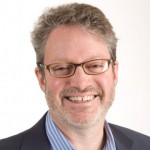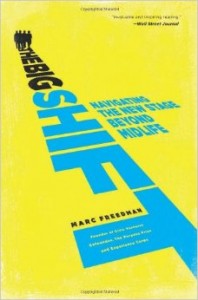If you’re intrigued by the kind of content we publish on the Hub, you should be fascinated by The Big Shift, a book published originally in 2011 by Marc Freedman.
The subtitle tells it all: Navigating the New Stage Beyond Midlife. Freedman is a “social entrepreneur” who founded a firm called Civic Ventures (now Encore.org), and previously published (in 2007) a book called Encore: Finding Work That Matters in the Second Half of Life. We’ll review that in the next few weeks.
Both books have crystallized my thinking of what this site is all about, so much so that we have renamed the fifth of our six major blog categories Encore Acts, (from the previous IBusiness Ownership). As we noted in Saturday’s new weekly wrap, an Encore Act may or may not include entrepreneurship but there are many Encore Acts that may not involve launching a new business.
The Longevity Bonus: centenarians galore?
The Big Shift also validates the other notion here that we must factor in extended Life Expectancy, which is the theme of our Longevity & Aging section. Freedman’s thesis is that there is emerging an entirely new stage between MidLife and that of “Old Age,” which used to coincide with what used to be called Retirement. So if you’re a baby boomer who is no longer a full-time employee of a large corporation or government entity, but too young or energetic to “retire” in the classic sense, then the idea of a 15- or 20-year “Encore” career (or “Second Act” or several similar phrases) has to be appealing.
If you’re a baby boomer launching a new venture in your late 50s or early 60s, I’ve dubbed these “Boomerpreneurs.” But the theme of extended longevity will be even more relevant if you’re a generation coming after the Boomers: GenXers and Millennials can almost certainly expect further medical breakthroughs by the time they reach the traditional retirement age, which by then will be somewhere between 67 and 70.

So how long can you expect to live? Freedman says that in 1900 the life span in the United States was 47, while it was “approaching 80” when he wrote the book in 2011.
“ … the length of life may well be headed toward the century mark. Some think the upward rise will be even more precipitous. … The old model simply doesn’t make sense for a one hundred-year life span.”
This new extended stage of life (roughly from 60 to 80) “has the potential to be the destination, what we’ve been working toward,” Freedman writes in The Big Shift, “It is a stage that people will strive to get to as quickly as possible, much in the way an earlier generation rushed to early retirement. Once there, they’ll very likely endeavour to stay there as long as possible.”
“Retirement” as cover for launching an Encore Act
As we noted at MoneySense on Wednesday, many people only THINK they want to retire, when in fact they may just need a sabbatical or a mini-retirement en route to charting the next major step of their career. As Freedman notes in one of his concluding chapters, Ten Steps Towards a New Stage, “Many people are already taking time off, in one form or another. Some even call it retirement … Many may be using the cover of retirement, followed by unretirement, as a kind of de facto gap period.”
Work will be a “core and defining feature” of the new stage of Encore Careers, Freedman writes, and it will be the “confluence of money, meaning, and social impact.”
“Most people need or want to work longer, but many don’t want to do the same thing they’ve been doing — or don’t have the option of staying the midlife course. They need to earn an income, but they want new work they feel good about, work that plows their experience into something lasting, something that improves the quality of life in their communities.”
This trend is already well established: already, almost 10 million boomers have moved into second careers and Freedman says half of those who haven’t yet done so say it’s a top priority for their next phase.
Findependence as the key to unlocking an encore career
Of course, financial independence is a big part of the preparation for this step. Addressing American readers, Freedman talks about some who tapped their children’s 529 accounts (like Canada’s RESPs) in order to go back to school themselves. He sensibly poses the question of why save for an extended period of not working (i.e. traditional retirement), “when what many really need are to cover the costs of more transition periods in life, most especially the one leading into the encore years?”
Freedman suggests governments need to create new IRA-like tax-advantaged savings vehicles — an Individual Purpose Account or IPA — to help fund these post-midlife career changes. Social Security could also be tweaked to permit the same thing. In this respect, it’s worth noting that Canada’s RRSP system (Registered Retirement Savings Plans, similar to IRAs) can already be used to fund higher education with no penalty.
Freedman shrewdly observes that if such vehicles were backed by the huge financial services industry, then “their marketing muscle is likely to go far in putting the new stage on the map.”
We’ll be returning to this theme frequently but if the topic resonates, I recommend reading the whole book, and similar titles highlighted in our Reviews section.


